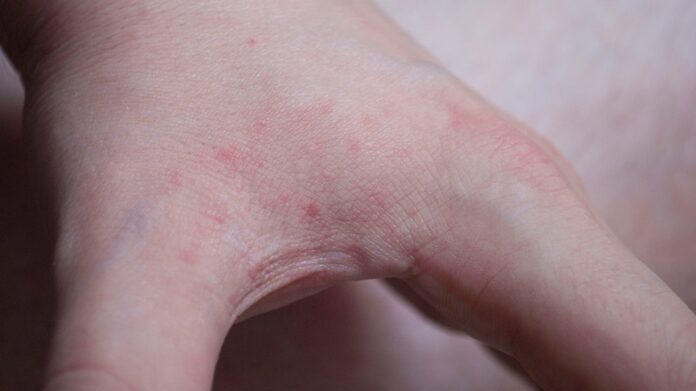
Bed bug bites can be a nightmare, causing incessant itching and discomfort. Among the body parts frequently affected, hands are particularly vulnerable. If you suspect that bed bugs are the culprits behind your hand irritation, this article will guide you on how to recognize and treat these pesky bites effectively.
Recognizing Bed Bug Bites on Hands
Identifying bed bug bites might prove challenging since they often resemble other insect bites. However, certain characteristics can help you differentiate them from other bugs’ hand bites:
1. Multiple Bites: Bed bugs leave multiple bites in a straight line or cluster on the skin, commonly referred to as a “breakfast, lunch, and dinner” pattern. If you notice several bites in this arrangement on your hands, it is highly likely that bed bugs are the cause.
2. Small Red Welts: Bed bug bites generally appear as small red welts with a darker red center. These welts may also be accompanied by inflammation or swelling around the affected areas.
3. Itching and Irritation: One of the most telling signs of a bed bug bite is the intense itching and irritation it causes. If you experience persistent itching on your hands, especially during the night when bed bugs are most active, they might be the culprits.
Treating Bed Bug Bites on Hands
To alleviate the discomfort and promote healing of bed bug bites on your hands, follow these treatment tips:
1. Wash the Affected Area: Gently wash your hands with mild soap and lukewarm water to cleanse the site of the bites. Avoid using harsh soaps or hot water, as they can further irritate the skin.
2. Apply Cold Compress: Use a cold compress or ice pack wrapped in a cloth to reduce swelling and help relieve itching. Apply it to the bites for 10-15 minutes several times a day, taking breaks in between to prevent frostbite.
3. Over-the-Counter Creams and Lotions: Topical creams or lotions containing hydrocortisone or calamine can provide relief from itching and inflammation associated with bed bug bites. Follow the product instructions and apply a thin layer to the affected areas.
4. Avoid Scratching: Although it may be tempting, scratching the bed bug bites on your hands can lead to skin infections. To prevent this, minimize scratching by keeping your nails short and clean or applying an anti-itch cream.
5. Antihistamines: Over-the-counter antihistamines can help with severe itching and promote better sleep. Consult your doctor or pharmacist to find the most suitable antihistamine for your needs.
6. Consult a Doctor: If the bites on your hands become severely swollen, blistered, or infected, it is advisable to seek medical attention. A doctor can assess your condition and prescribe stronger medications, such as corticosteroids or antihistamines, if necessary.
Preventing Future Bed Bug Bites
To avoid recurring bed bug bites on your hands, take the following preventive measures:
1. Protect Your Bed: Cover your mattress and pillows with bed bug-proof encasements to prevent infestation. Regularly check for signs of bed bugs, such as rusty-colored stains or shed bed bug skins.
2. De-Clutter Your Space: Reduce hiding spots for bed bugs by de-cluttering your living area. Vacuum regularly, especially in hidden corners and crevices where bed bugs may reside.
3. Launder Infested Items: Wash infested clothing, linens, and fabrics in hot water, followed by a high-heat drying cycle. This helps kill any bed bugs or eggs present.
4. Seal Entry Points: Inspect your home for potential entry points where bed bugs can enter. Seal cracks, repair damaged walls, and use door sweeps to prevent infestations.
5. Use a Bed Bug Repellent: Consider using a bed bug repellent, such as those containing natural ingredients like essential oils, to deter these pests from biting you while you sleep.
Conclusion
Bed bug bites on hands can be incredibly frustrating, but with proper recognition and treatment, you can find relief. By identifying the distinguishing features of bed bug bites and following the outlined treatment tips, you can alleviate itching and reduce inflammation. Additionally, taking preventive measures to avoid future infestations ensures a good night’s sleep without the discomfort of bed bug bites on your hands.

















